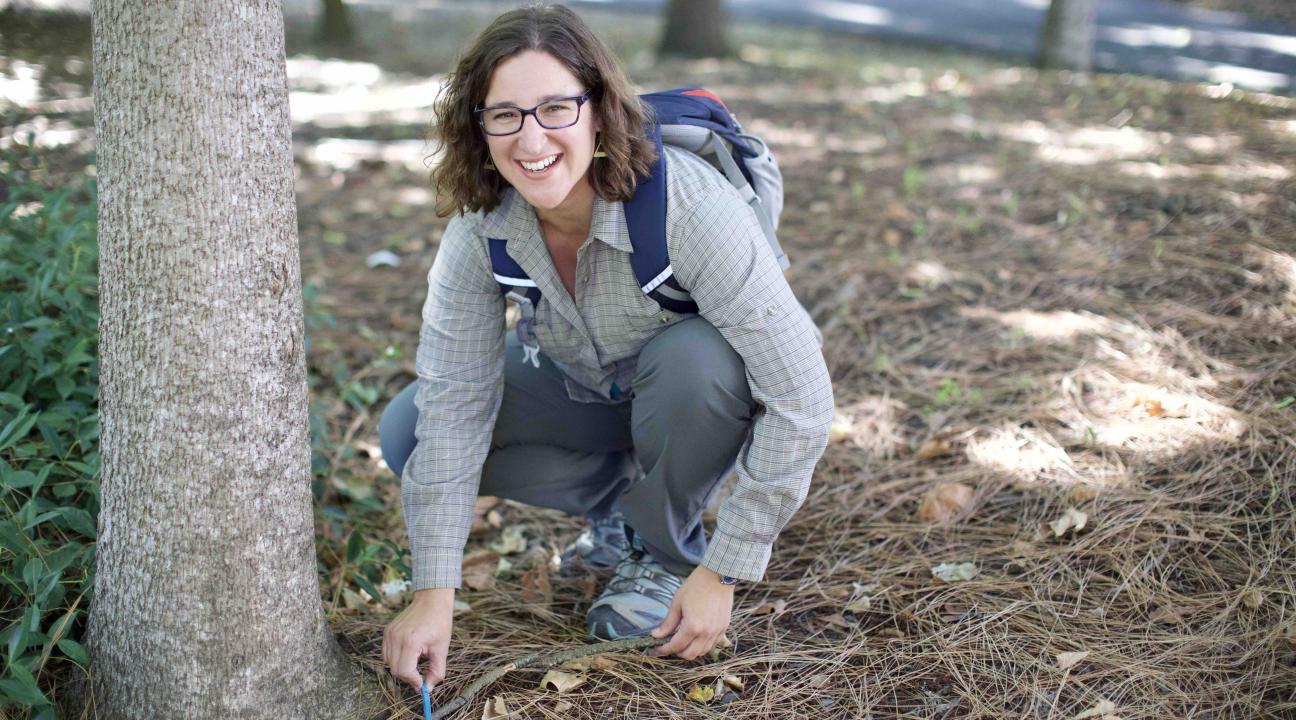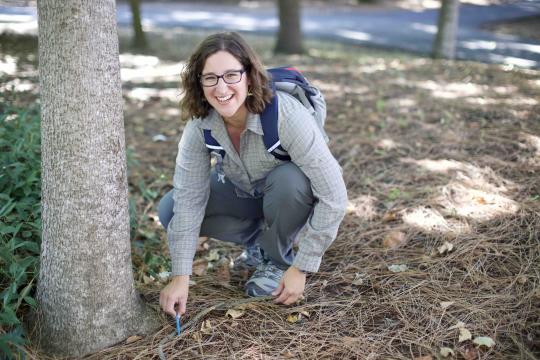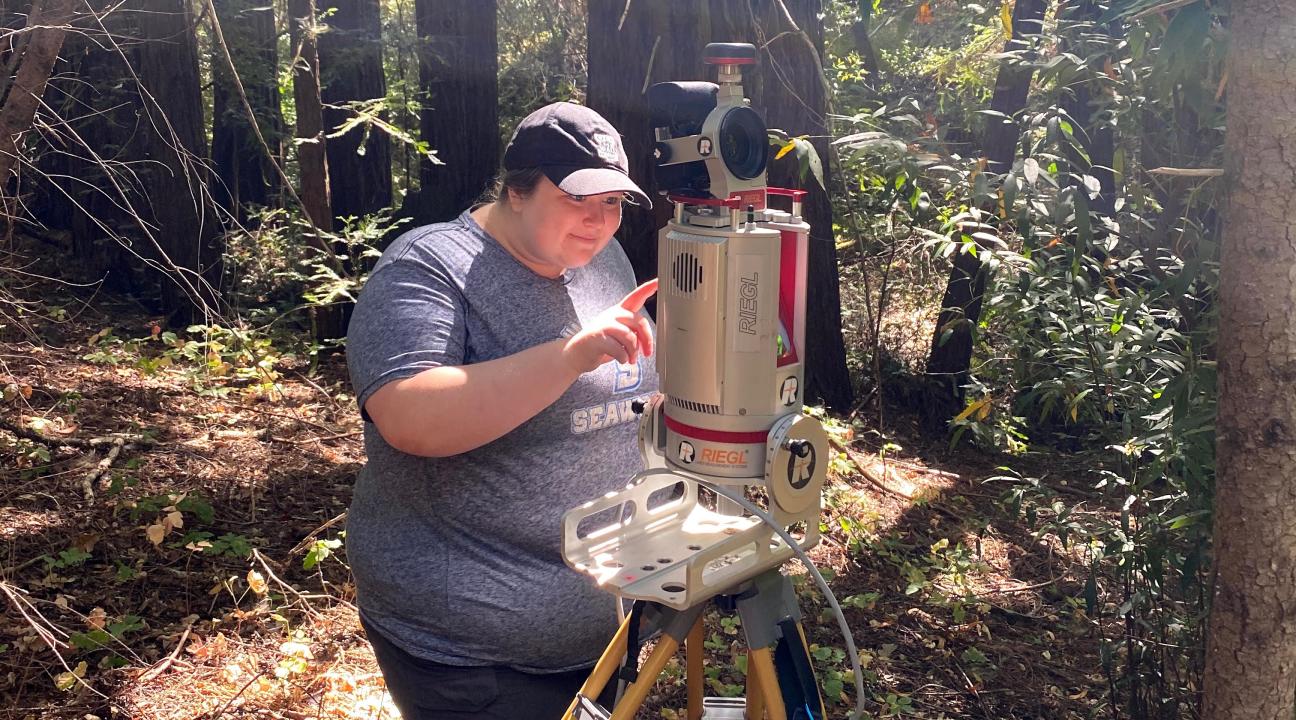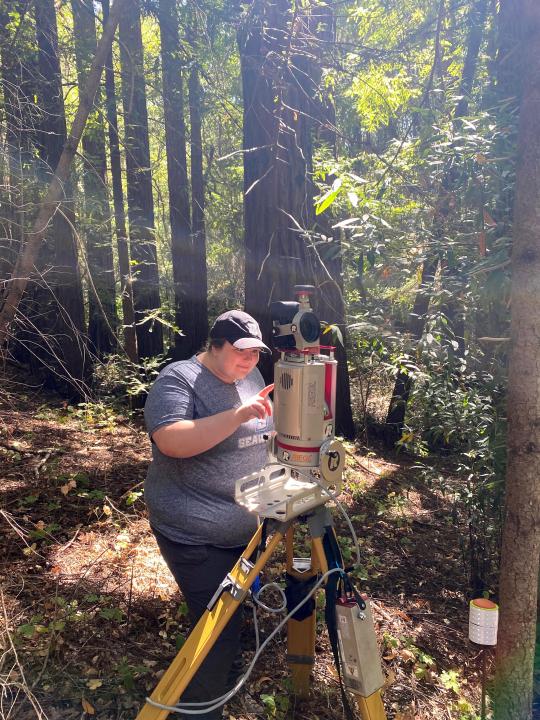SSU receives $1.1 million to study the effect of wildfire on forest health in California and to create virtual educational activities
By Nate Galvan | [email protected]
(Rohnert Park, CA) — The National Science Foundation (NSF) has awarded Dr. Lisa Patrick Bentley, associate professor in the Biology Department at Sonoma State University, a $1.1 million grant to research fire and ecosystem ecology in California and develop educational outreach activities. The funding will enable Sonoma State biology students to employ state-of-the-art remote sensing equipment to collect biological data essential to furthering our understanding of forest structure, from determining its impact on past wildfire intensity to predicting how it affects future wildfire risk.
Working with graduate and undergraduate biology students, Sonoma State Biology professor Lisa Patrick Bentley will use a terrestrial LiDAR scanner (TLS) to capture extraordinarily detailed 3D images of local forests. Combining TLS data of tree size with, measured leaf traits and climate data, Dr. Bentley and her team will be able to determine how much carbon is stored in the forest study sites. The research is also critical to help predict how altered forest structures — ones that have gone through timber harvests or been burned by wildfire — affect future wildfire risk. Dr. Bentley and her team will conduct their research at Pepperwood Preserve in Sonoma County and three CALFIRE Demonstration State Forests: Latour in Shasta County, Jackson in Mendocino County, and Mountain Home in Tulare County.
“Given the effect that wildfire has already had in Sonoma County, I would argue that there is a strong connection between this research and all of the residents of Sonoma County,” Bentley said.
Dr. Bentley is the first person in the history of SSU to receive a grant as part of the NSF’s Faculty Early Career Development Program, which offers the foundation's most prestigious awards “in support of early-career faculty who have the potential to serve as academic role models in research and education.”
“Receiving this grant highlights how research at SSU can be recognized at the national scale by one of the top federal science funding agencies,” Dr. Bentley said. “It also is a testament to the hard work of the graduate students and undergraduates in the Biology Department and students and faculty in the GEP Department that worked many hours in the field and in the lab to collect and analyze data to help contribute to the ideas contained in this proposal.” Indeed, this NSF grant follows an additional $1M in funding that Dr. Bentley and her team have received from CALFIRE’s Forest Health Program, the CSU’s Agricultural Research Institute, and the Joint Fire Science Program.
Dr. Bentley said her long-term education goals at SSU are to train students and educate community members on the impacts of climate change on local ecosystems. In alignment with SSU’s goal to improve retention and graduation rates and eliminate all equity gaps, Dr. Bentley said she aims to connect her educational goals to the demand for high-impact academic experiences for a more diverse group of students.
“This is a very significant grant and one that is highly competitive,” said Elisabeth Wade, dean of the School of Science and Technology. “We could not be prouder of Dr. Bentley and her work, and we are delighted to see it acknowledged in this way.”
As part of the grant, Dr. Bentley and her graduate students will mentor first-year underrepresented biology students to create a virtual "field trip" using their research findings on wildfire and forest structure. The video-based excursion will traverse through the forests Dr. Bentley researches, providing educational information on climate change, local tree species, fire fuels, and land management. These new virtual activities will be integrated into the Biology curriculum and also be a part of "The Virtual Field,” another NSF-funded project affiliated with Sonoma State through Dr. Claudia Luke, director of the Center for Environmental Inquiry. "The Virtual Field” creates and shares virtual teaching materials and events worldwide from research or educational sites.
Dr. Bentley’s educational outreach work extends beyond Sonoma State. The grant will allow her to connect with an even younger, but equally important, demographic. In the years ahead, Dr. Bentley will adapt the “field trip” from virtual to virtual reality (VR) for 4th through 6th-grade students at Loma Vista Immersion Academy in Petaluma, a Spanish dual-immersion school. The VR experience will also be available for public outreach at SSU’s Fairfield-Osborn Preserve. Virtual reality (VR) teaching is especially relevant during the COVID-19 pandemic for students and the public to experience real-world issues, such as the effects of wildfire on California forests. In addition, it also broadens participation in-field learning and expands opportunities for a more diverse group of students.
“I have been working since I arrived at SSU to win this grant, as it required me to show that I am building a successful research program and that I have a framework set up to use novel approaches to integrate my research into education,” Dr. Bentley said, who arrived at SSU in 2016 and received tenure and a promotion to associate professor in August 2021.
To learn more about Dr. Bentley’s project, “3DForests: Using Terrestrial Laser Scanning To Explore Forest Structure Changes Following Disturbance”, visit the National Science Foundation or Dr. Bentley’s lab website. Visit the SSU Biology Department to find other exciting research and see how SSU is preparing undergraduate and graduate students to meet the biological, environmental, and technological challenges of the future.





